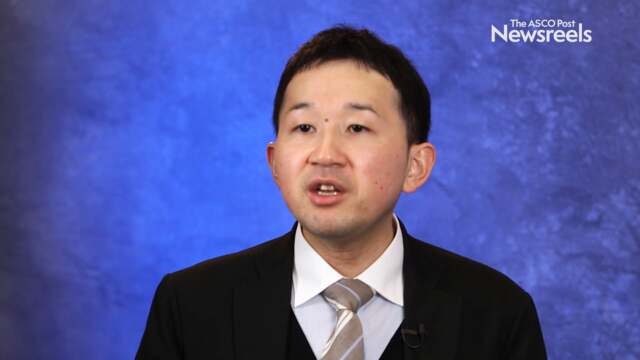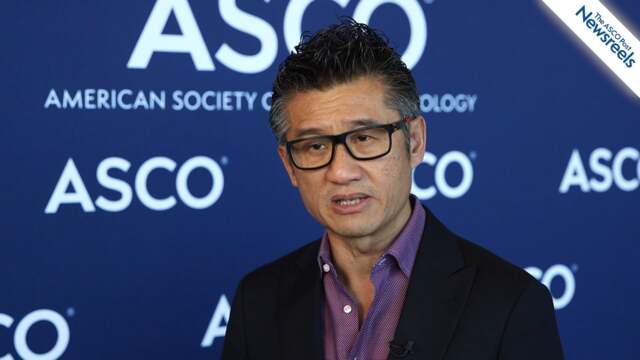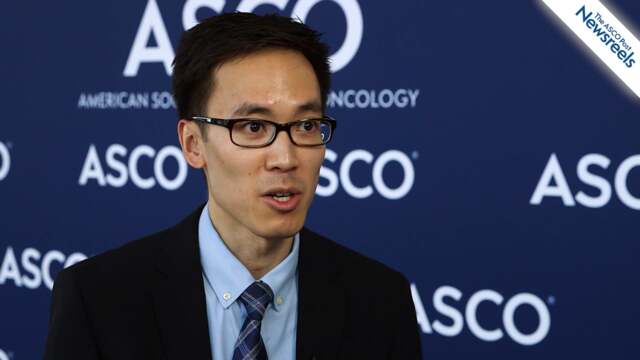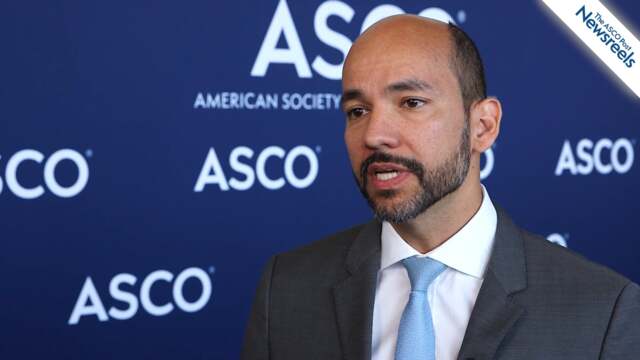Evidence Builds for Tumor Mutational Burden as Biomarker in Lung Cancer
TUMOR MUTATIONAL burden is emerging as a predictive biomarker for the combination of nivolumab (Opdivo) plus ipilimumab (Yervoy) in non–small cell lung cancer (NSCLC), as well as other tumor types. However, experts say tumor mutational burden has hurdles to overcome. At the 2018 Annual Meeting of...
Expert Point of View: David Graham, MD, FASCO
ASCO EXPERT David Graham, MD, FASCO, Medical Director at the Levine Cancer Institute in Charlotte, North Carolina, was enthusiastic about this new technology. “This is an important first step showing there is an easier way to detect lung cancer at earlier stages. If the promise of this report...
Genome Sequencing of Blood Samples May Lead to Detection of Early- Stage Lung Cancer
IF THE INITIAL promise of research presented at the 2018 ASCO Annual Meeting bears fruit, we may one day have a simple blood test to screen for early-stage lung cancer and possibly other cancers. Although it is still very early days for this test, an initial report from the ongoing Circulating...
Expert Point of View: Marina Chiara Garassino, MD, and Justin Gainor, MD
“TODAY WE HAVE good news, because IMpower 150 is another clear positive trial on the combination of chemotherapy with immunotherapy. This is true in terms of progression-free and overall survival, which are both statistically significant [for atezolizumab (Tecentriq) plus bevacizumab (Avastin)...
More Evidence of Benefit With Immunotherapy and Chemotherapy in Nonsquamous Non–Small Cell Lung Cancer
ATEZOLIZUMAB (TECENTRIQ) plus bevacizumab (Avastin) plus a platinum doublet (ABCP) improved overall survival by 22% compared with bevacizumab plus a platinum doublet (BCP) in patients with advanced wild-type (without an identified mutation) nonsquamous non–small cell lung cancer (NSCLC), according...
Expert Point of View: Charles Drake, MD, PhD
“THIS TRIAL is a clear winner for the treatment of squamous non–small cell lung cancer [NSCLC],” stated formal discussant Charles Drake, MD, PhD, of Herbert Irving Comprehensive Cancer Center, Columbia University Medical Center, New York. “The concept underlying the combination of checkpoint...
KEYNOTE-407: Pembrolizumab Plus Chemotherapy Benefits Response, Survival in Squamous NSCLC
THE COMBINATION of pembrolizumab (Keytruda) plus platinum-based chemotherapy improved overall survival, response rates, and duration of response in patients with advanced squamous cell non–small cell lung cancer (NSCLC) compared with chemotherapy alone irrespective of programmed cell death ligand 1 ...
Racial/Ethnic Disparities in End-of-Life Care Among Patients With Lung Cancer
Significant disparities in the quality of end-of-life lung cancer care were found among racial/ethnic minorities, with higher odds of experiencing potentially preventable medical encounters during end of life as compared with non-Hispanic whites. These findings were published by Siddharth Karanth, ...
Addition of Veliparib to Temozolomide in Recurrent Small Cell Lung Cancer
In a phase II trial reported in the Journal of Clinical Oncology, Pietanza et al found no benefit of adding the PARP inhibitor veliparib to temozolomide (Temodar) in recurrent platinum-sensitive or platinum-refractory small cell lung cancer. Benefit was observed with the combination in the subgroup ...
IMpower133: Atezolizumab in Combination With Chemotherapy in Previously Untreated, Extensive-Stage Small Cell Lung Cancer
The phase III IMpower133 study recently met its coprimary endpoints of overall survival (OS) and progression-free survival (PFS) at its first interim analysis. The study demonstrated that first-line treatment with the combination of atezolizumab (Tecentriq) plus chemotherapy (carboplatin and...
FDA Accepts sBLA for First-Line Nivolumab Plus Low-Dose Ipilimumab in NSCLC With Tumor Mutational Burden ≥ 10 mut/mb
The U.S. Food and Drug Administration (FDA) recently accepted a supplemental biologics license application (sBLA) for nivolumab (Opdivo) plus low-dose ipilimumab (Yervoy) for the first-line treatment of advanced non–small cell lung cancer (NSCLC) in patients with a tumor mutational burden...
ERBB Mutations and Outcomes With Afatinib and Erlotinib in Squamous NSCLC
In an analysis of the LUX-Lung 8 trial in squamous non–small cell lung cancer (NSCLC) reported in JAMA Oncology, Goss et al found that outcomes among patients treated with afatinib (Gilotrif) were better for those with vs without ERBB mutations. The LUX-Lung 8 trial showed that afatinib was...
IASLC Issues Statement Paper on Liquid Biopsy for Lung Cancer
The lungs can be a difficult organ to biopsy with a needle, so the promise of identifying lung cancer through a blood-based biopsy has lung cancer experts and patients optimistic. Knowing how and when to use a liquid biopsy is critically important and led global experts at the International...
Addition of Atezolizumab to Bevacizumab and Chemotherapy in First-Line Treatment of Metastatic Nonsquamous NSCLC
As reported at the 2018 ASCO Annual Meeting and in The New England Journal of Medicine by Socinski et al, the phase III IMpower150 trial has shown that the addition of atezolizumab (Tecentriq) to bevacizumab (Avastin) plus chemotherapy significantly improved progression-free and overall survival in ...
FDA Expands Approval of Pembrolizumab for First-Line Treatment of NSCLC
The U.S. Food and Drug Administration (FDA) recently granted accelerated approval to the immune checkpoint inhibitor pembrolizumab (Keytruda) for use in combination with chemotherapy as a first-line treatment for patients with metastatic non–small cell lung cancer (NSCLC). KEYNOTE-021 This...
Disparities Found in Lung Cancer Care, Survival in United States vs England
DESPITE STEADY declines in death rates in recent years, lung cancer remains the leading cause of cancer deaths in wealthy countries. In a study published by Anita Andreano, MD, of the University of Milan-Ciocco, and colleagues in the Journal of Thoracic Oncology,1 Yale researchers collaborated with ...
Nivolumab Plus Ipilimumab Improves Progression-Free Survival in NSCLC With High Tumor Mutational Burden
The combination of nivolumab (Opdivo) plus ipilimumab (Yervoy) improved progression-free survival compared with chemotherapy as first-line treatment for patients with advanced non–small cell lung cancer (NSCLC) and a high tumor mutational burden irrespective of programmed cell death ligand 1...
Final Overall Survival Analysis of First-Line Crizotinib vs Chemotherapy in Advanced ALK-Positive NSCLC
As reported by Solomon and colleagues in the Journal of Clinical Oncology, the final overall survival results of the phase III PROFILE 1014 trial showed evidence of survival benefit of first-line crizotinib (Xalkori) vs chemotherapy in advanced ALK-positive non–small cell lung cancer (NSCLC). ...
Prophylactic Cranial Irradiation in Stage III NSCLC
In a Dutch phase III trial reported in the Journal of Clinical Oncology, De Ruysscher et al found that prophylactic cranial irradiation (PCI) prevented symptomatic brain metastases vs observation in patients with stage III non–small cell lung cancer (NSCLC) receiving treatment with curative...
Studies of Daratumumab in Combination With Anti–PD-L1 Agents Stopped
On May 26, Genmab A/S announced that following a planned review, the Data Monitoring Committee (DMC) has recommended that the phase Ib/II study (CALLISTO/LUC2001) of daratumumab (Darzalex) in combination with the anti–programmed cell death ligand 1 (PD-L1) antibody atezolizumab (Tecentriq) vs ...
Lung Cancer Incidence in Young Women vs Men in the United States
In a study reported in The New England Journal of Medicine, Jemal et al found that the incidence of lung cancer in young white and Hispanic women is now higher than that in men in the US. Study Details The study involved analysis of data from the North American Association of Central Cancer...
Characteristics and Screening of Brain Metastases in Breast Cancer and NSCLC
In a research letter published in JAMA Oncology, Cagney et al found that brain metastases were more advanced and more likely to be symptomatic in patients with breast cancer compared to patients with non–small cell lung cancer (NSCLC). Current guidelines recommend magnetic resonance imaging...
Analysis of Intracranial Response to Brigatinib in ALK-Positive NSCLC With Brain Metastases
In an analysis of two clinical trials reported in the Journal of Clinical Oncology, Camidge et al found that brigatinib (Alunbrig) produced high intracranial response rates and good intracranial progression-free survival in patients with ALK-positive non–small cell lung cancer (NSCLC) and...
Expert Point of View: John V. Heymach, MD, PhD
FORMAL DISCUSSANT of this trial, John V. Heymach, MD, PhD, of The University of Texas MD Anderson Cancer Center, Houston, also was optimistic about these early findings. “This is a proof-of-concept study showing this approach is safe. Only modest activity was observed with standard [Response...
Early Evidence of Neoadjuvant PD-1 Blockade in Non–Small Cell Lung Cancer
A NOVEL APPROACH using two doses of nivolumab (Opdivo) prior to surgery achieved major pathologic responses in 45% of patients with resectable stages I to IIIA non–small cell lung cancer (NSCLC), according to the results of a small Stand Up 2 Cancer–Cancer Research Institute Dream Team study...
Quick Takes From Original Research Presented at the 2018 NCCN Annual Conference
THE QUANTITY of original research presented at the National Comprehensive Cancer Network® (NCCN®) Annual Conference has been growing, and at the 2018 meeting, 121 researchers presented their work. The ASCO Post captured some of the findings for this report. Blood Markers Correlate With Anti–PD-1...
Expert Point of View: Bruce Johnson, MD, FASCO
“PRECISION MEDICINE is driving the most exciting and powerful advances in cancer care today, particularly in lung cancer. It’s encouraging to see that next-generation genetic testing tools can help physicians and their patients get the crucial genomic information needed to make treatment decisions, ...
Decision-Analytic Model Finds Upfront, Comprehensive Genetic Testing in Advanced Lung Cancer Is Cost-Efficient
AN ECONOMIC model comparing different types of genetic testing in metastatic non–small cell lung cancer (NSCLC) found using next-generation sequencing to test for all known lung cancer–related gene changes at the time of diagnosis was less costly and faster than sequentially testing one or a...
Expert Point of View: Bruce Johnson, MD, FASCO
“THIS STUDY makes a strong case that our country needs an effective public service campaign about encouraging lung cancer screening,” said ASCO President Bruce E. Johnson, MD, FASCO, during a press briefing before the 2018 ASCO Annual Meeting. “Public service campaigns from the 1990s encouraged...
Despite USPSTF Recommendations, Majority of Heavy Smokers Not Screened for Lung Cancer
AN ANALYSIS of 1,800 lung cancer screening sites nationwide found that only 1.9% of more than 7 million eligible current and former heavy smokers were screened for lung cancer in 2016, despite U.S. Preventive Services Task Force (USPSTF) and ASCO screening recommendations. Results from this...
Expert Point of View: John Heymach, MD, PhD, and Leena Gandhi, MD
“THIS STUDY represents a true milestone in the field of lung cancer. For the first time, the vast majority of patients with non–small cell lung cancer (NSCLC) can receive immunotherapy with pembrolizumab (Keytruda),” said ASCO expert John Heymach, MD, PhD, of MD Anderson Cancer Center, Houston,...
Immunotherapy Benefits Survival, Improves Safety, vs Platinum-Based Chemotherapy for PD-L1–Expressing NSCLC
IMMUNOTHERAPY WITH pembrolizumab (Keytruda) improved overall survival compared with investigator’s choice of platinum-based chemotherapy as first-line treatment for patients with advanced non–small cell lung cancer (NSCLC) in the KEYNOTE-042 trial. Median overall survival was improved by 4 to 8...
Chemoradiation in Elderly Patients With Stage III NSCLC Improves Overall Survival
Elderly patients with stage III non–small cell lung cancer (NSCLC) showed improved overall survival when treated with chemoradiation compared with definitive radiation alone, according to findings published by Eric D. Miller, MD, PhD, of The Ohio State University, Columbus, and colleagues in the...
2018 ASCO: Pembrolizumab Plus Chemotherapy as First-Line Treatment of Metastatic Squamous NSCLC: KEYNOTE-407 Study
Results from KEYNOTE-407, a randomized, double-blind, placebo-controlled, phase III study evaluating pembrolizumab (Keytruda) in combination with carboplatin/paclitaxel or carboplatin/nab-paclitaxel (Abraxane) as first-line treatment for metastatic squamous non–small cell lung cancer...
2018 ASCO: Dacomitinib vs Gefitinib in Advanced NSCLC With EGFR-Activating Mutations
Overall survival (OS) data from the ARCHER 1050 trial evaluating dacomitinib as a first-line treatment for patients with locally advanced or metastatic non–small cell lung cancer (NSCLC) with EGFR-activating mutations compared to gefitinib showed a median OS of 34.1 months for patients...
ASCO 2018: Updated ALEX Trial Results on Alectinib in Treatment-Naive ALK Mutation–Positive NSCLC
Updated results of the global phase III ALEX trial comparing alectinib (Alecensa) with crizotinib (Xalkori) as first-line treatment against ALK-positive non–small cell lung cancer (NSCLC) show a median progression-free survival of 34.8 months in 152 patients treated with alectinib vs 10.9...
Raymond U. Osarogiagbon, MBBS, on NSCLC: A Lymph Node Collection Kit
Raymond U. Osarogiagbon, MBBS, of Baptist Cancer Center, discusses a kit used in non–small cell lung cancer resection that improves staging quality and overall survival without adding to morbidity of curative surgery (Abstract 8502).
Naoki Furuya, MD, PhD, on NSCLC: Results From the NEJ026 Study
Naoki Furuya, MD, PhD, of the St. Marianna University School of Medicine, discusses phase III study findings on a comparison of bevacizumab plus erlotinib to erlotinib in patients with untreated non–small cell lung cancer with activating EGFR mutations (Abstract 9006).
Tony Mok, MD, on NSCLC: Results From the ARCHER 1050 Trial
Tony Mok, MD, of the Chinese University of Hong Kong, discusses study findings on dacomitinib vs gefitinib for first-line treatment of advanced non–small cell lung cancer, a final overall survival analysis.
Nathan A. Pennell, MD, PhD, on NSCLC: Lowering Genetic Testing Costs
Nathan A. Pennell, MD, PhD, of the Cleveland Clinic, discusses the economic impact of next generation sequencing vs sequential single-gene testing modalities to detect genomic alterations in newly diagnosed metastatic non–small cell lung cancer (Abstract 9031).
Danh Pham, MD: Lung Cancer Screening Rates Still Too Low
Danh Pham, MD, of the James Graham Brown Cancer Center, University of Louisville, discusses his findings using a registry on the low rates of screening with low-dose computed tomography, despite its potential to prevent thousands of lung cancer deaths each year (Abstract 6504).
Gilberto Lopes, MD, MBA, on NSCLC: Results From the KEYNOTE-042 Trial
Gilberto Lopes, MD, MBA, of the Sylvester Comprehensive Cancer Center at the University of Miami, discusses phase III findings on pembrolizumab vs platinum-based chemotherapy as first-line treatment for advanced/metastatic non–small cell lung cancer with a PD-L1 tumor proportion score ≥ to 1% (Abstract LBA4).
2018 ASCO: KEYNOTE-042 Trial Compares Pembrolizumab With Chemotherapy as First-Line Treatment of NSCLC With PD-L1 Expression of 1% or More
A large, randomized phase III trial shows that the immunotherapy pembrolizumab (Keytruda) is a more effective initial treatment than chemotherapy (the current standard of care) for the majority of patients with the most common type of lung cancer. People with advanced non–small cell lung...
Geoffrey R. Oxnard, MD, on Lung Cancer: Results From the Circulating Cancer Genome Atlas Study
Geoffrey R. Oxnard, MD, of Dana-Farber Cancer Institute, discusses genome-wide sequencing for early-stage lung cancer detection from plasma cell–free DNA (Abstract LBA8501).
Robert M. Jotte, MD, PhD, on NSCLC: Results From the IMpower131 Trial
Robert M. Jotte, MD, PhD, of Rocky Mountain Cancer Centers, discusses phase III study findings on atezolizumab plus carboplatin plus paclitaxel or nab-paclitaxel vs carboplatin plus nab-paclitaxel, as first-line therapy in advanced squamous non–small cell lung cancer (Abstract LBA9000).
2018 ASCO: Blood Test Shows Potential as a Detection Tool for Early-Stage Lung Cancer
An initial report from the large, ongoing Circulating Cell-Free Genome Atlas (CCGA) study provides preliminary evidence that a blood test may be able to detect early-stage lung cancer. This is one of the first studies to explore blood tests analyzing free-floating or cell-free DNA as a tool for the ...
2018 ASCO: IMpower 131 Studies Addition of Atezolizumab to Chemotherapy in Advanced Squamous NSCLC
Initial findings from a randomized phase III clinical trial showed that patients with advanced squamous non–small cell lung cancer (NSCLC) benefit more from initial treatment with the programmed cell death ligand 1 (PD-L1)-targeted immunotherapy atezolizumab (Tecentriq) and chemotherapy than...
Safety of PD-1/PD-L1 Inhibitors in Patients With NSCLC and Preexisting Autoimmune Disorders
In a study reported in the Journal of Clinical Oncology, Leonardi et al found that programmed cell death protein 1 (PD-1)/programmed cell death ligand 1 (PD-L1) inhibitor monotherapy in patients with non–small cell lung cancer (NSCLC) and autoimmune disorders worsened such disorders in a...
Valued Mentors and a Link Between Science and Medicine Paved the Road to Oncology for Alice Tsang Shaw, MD, PhD
Lung cancer expert Alice Tsang Shaw, MD, PhD, was born and reared in Gaithersburg, a small suburb located to the northwest of Washington, DC. Both her parents were chemists, and during high school, Dr. Shaw had a keen interest in science, particularly biology, yet the thought of pursuing a career...
Risk-Prediction Tool Helps Tailor Lung Cancer Screening to Patient Preference and Clinical Benefit
A microsimulation model study found that the benefits of low-dose computed tomography (CT) screening for lung cancer varied substantially across the eligible population, with 3 factors being particularly influential: lung cancer risk, competing risks or life expectancy, and patient...








